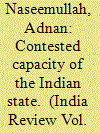| Srl | Item |
| 1 |
ID:
149615


|
|
|
|
|
| Summary/Abstract |
State capacity is often seen as simply the resources and capabilities of state organizations to perform those functions that are seen as essential to monopolizing coercion, maintaining legitimacy, and providing key public and social goods. As such, it is often conceptualized as value-neutral and comparable across national contexts. By contrast, this article posits that in the Indian context, state capacity is a politically contested concept, because there is deep and enduring political conflict in India over the appropriate roles and related capabilities of state power. This conflict is grounded in disagreements between those who wish to use the state as a tool to transform society and those who see it as a means to preserve and protect social relations. As a result of this conflict, the state in India is not weak or captured but internally divided and thus disarticulated. This article demonstrates these dynamics through an examination of state intervention in the statist and post-liberalization political economy of India.
|
|
|
|
|
|
|
|
|
|
|
|
|
|
|
|
| 2 |
ID:
149613


|
|
|
|
|
| Summary/Abstract |
This article views electoral campaigns as a means of communication in the process of electoral coordination. Well-manned and well-funded district campaigns facilitate voters’ learning about the policies of competing parties; if the funds and the activist support are supplied by local constituencies, campaigning also informs voters about the relative support of competing parties in the district. Using district-level data from the 2009 general election in India, as well as the measures of the affluence of district residents obtained from the Indian Human Development Survey, 2005, an estimation was made of the effect of the affluence of electoral constituencies on the intra-district coordination. The analysis also includes the known determinants of strategic voting as control variables.
|
|
|
|
|
|
|
|
|
|
|
|
|
|
|
|
| 3 |
ID:
149614


|
|
|
|
|
| Summary/Abstract |
In this article, the authors conduct a comparative review of the strategic imperatives driving Sino-Indian policy on Afghanistan in the post-2014 scenario. The article argues that divergent strategic imperatives make cooperation difficult and/or unlikely. This analysis is based on a broader consideration of both contemporary history and geopolitical dynamics shaping the foreign policy considerations of these two countries, and an assessment of the impact of ongoing bi-lateral and regional aspirations. The authors begin by highlighting the salient dynamics that have historically characterized and driven Indian and Chinese foreign policy in general and on Afghanistan. They find that Afghanistan, although not a primary focus of either state’s foreign or security policy, historically, is increasing in importance for both; India and China compete on a range of economic and security issues.
|
|
|
|
|
|
|
|
|
|
|
|
|
|
|
|